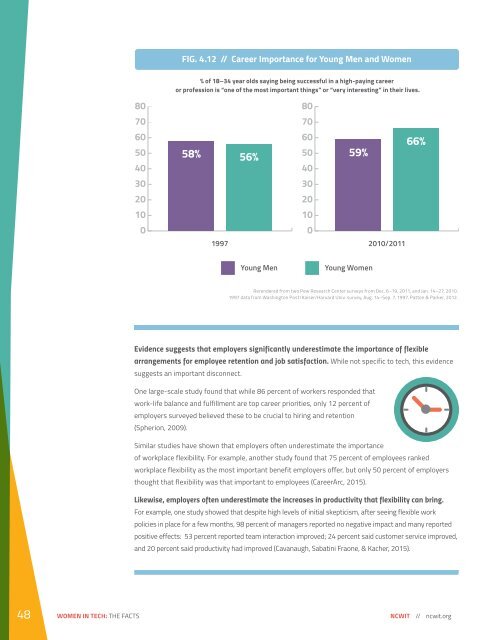WOMEN IN TECH THE FACTS
womenintech_facts_fullreport_05132016
womenintech_facts_fullreport_05132016
You also want an ePaper? Increase the reach of your titles
YUMPU automatically turns print PDFs into web optimized ePapers that Google loves.
FIG. 4.12 // Career Importance for Young Men and Women<br />
% of 18–34 year olds saying being successful in a high-paying career<br />
or profession is “one of the most important things” or “very interesting” in their lives.<br />
80<br />
70<br />
60<br />
50<br />
40<br />
30<br />
20<br />
10<br />
0<br />
80<br />
70<br />
60<br />
66%<br />
58% 56%<br />
50 59%<br />
40<br />
30<br />
20<br />
10<br />
0<br />
1997<br />
2010/2011<br />
Young Men<br />
Young Women<br />
Rerendered from two Pew Research Center surveys from Dec. 6–19, 2011, and Jan. 14–27, 2010.<br />
1997 data from Washington Post/Kaiser/Harvard Univ. survey, Aug. 14–Sep. 7, 1997. Patten & Parker, 2012.<br />
Evidence suggests that employers significantly underestimate the importance of flexible<br />
arrangements for employee retention and job satisfaction. While not specific to tech, this evidence<br />
suggests an important disconnect.<br />
One large-scale study found that while 86 percent of workers responded that<br />
work-life balance and fulfillment are top career priorities, only 12 percent of<br />
employers surveyed believed these to be crucial to hiring and retention<br />
(Spherion, 2009).<br />
Similar studies have shown that employers often underestimate the importance<br />
of workplace flexibility. For example, another study found that 75 percent of employees ranked<br />
workplace flexibility as the most important benefit employers offer, but only 50 percent of employers<br />
thought that flexibility was that important to employees (CareerArc, 2015).<br />
Likewise, employers often underestimate the increases in productivity that flexibility can bring.<br />
For example, one study showed that despite high levels of initial skepticism, after seeing flexible work<br />
policies in place for a few months, 98 percent of managers reported no negative impact and many reported<br />
positive effects: 53 percent reported team interaction improved; 24 percent said customer service improved,<br />
and 20 percent said productivity had improved (Cavanaugh, Sabatini Fraone, & Kacher, 2015).<br />
48 <strong>WOMEN</strong> <strong>IN</strong> <strong>TECH</strong>: <strong>THE</strong> <strong>FACTS</strong> NCWIT // ncwit.org


